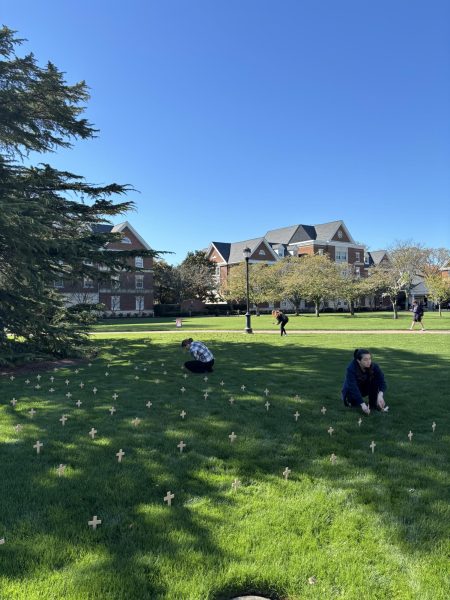Suspicious Activity on Campus Sparks Concern Amongst Students
Religiously affiliated group mistaken for sex traffickers
Last week, the CNU community was on high alert due to suspicious encounters with an outside group on campus. Students raised concerns about being approached by people in a white van who would ask about their religious affiliation. Some said that they were asked to go to “bible study” at an alternate location.
These encounters left many members of the CNU community feeling unsafe when walking around campus. With the group’s unusual methods of confronting students, rumors of potential sex trafficking quickly spread.
On Nov. 2, the CNU Police Department Chief Dan Woloszynowski
issued a statement to faculty, employees, and students addressing the issue, “Recently, several students and staff have reported they have been approached by individuals on or near campus who identified themselves as being affiliated with an off- campus faith group. It was reported the individuals engaged University community members in conversation that was religious in nature. Some folks were encouraged to exchange contact information, allow their photograph to be taken, and/or travel with the individuals to an off-campus location to participate in what has been described as ‘Bible study’ at a nearby house of worship.”
This would not be the first time that incidents like this have occurred in the Newport News community. Similar concerns regarding sex trafficking arose in Dec. 2020 after numerous reports of being approached and asked about “God the Mother,” according to an old article from The Virginian-Pilot. The group was identified as Evangelists from the Newport News Church, not sex traffickers. The article noted that incidents occurred in malls, parking lots, and college campuses.
Woloszynowski’s email continued, “Obviously, these types of interactions are inconsistent with what is normally happening on or around campus. Fortunately, the timely reporting enabled University Police to identify the individuals affiliated with the faith group. University Police were able to contact the faith group and led a discussion intended to promote a safer method of engagement and communication for University community members, and for the members of the faith group.”
Woloszynowski urged the community to report any suspicious activity or situation as soon as possible by calling 757-594-7777 to reach a Communications Officer who is available 24 hours a day. They can also contact that number if they have any questions.
In addition, he advised community members to “be kind,” but exercise “good judgment” and encouraged them to use caution and avoid traveling off-campus with strangers.
The email included the safety tips listed below:
- · Program your cell phone: Program your phone to speed dial the University Police 24/7 emergency number 757-594-7777 and 911 (for when you’re off campus).
- · Escort: If at any point you feel unsafe, please call University Police at 757-594-7777 for a walking escort.
- · ICE: Assign an “In Case of Emergency” number (ICE) in your cell phone; this is the person you want contacted first in an emergency. Rescuers are trained to check your cell phone for an ICE entry.
- · Pathways: If possible, travel on well-lit pathways and be accompanied by another person.
- · Travel with a Friend: Remember, there is safety in numbers. Always walk or run with a friend.
- · Carry Identification: Always carry some form of identification, even when running.
- · Suspicious Activity: Notify University Police of any suspicious persons, conditions or objects. We will respond and investigate.
- · When Alone: If possible, telephone ahead to your destination that you’re on the way.
- · Wear Only One Headphone/Earbud: Bluetooth devices inhibit your ability to hear approaching automobiles, audible alerts and individuals who may be intent on harming you.
- · Stay Alert: Focus on surroundings. Avoid texting while walking, especially when crossing streets.
- · Be Discrete: Be careful not to display money in public and be sure necklaces and other jewelry are not visible.
- · Plan-Seeking Assistance: Know where to obtain help in the event you may need it; pre-plan escape routes. Know the locations of stores or businesses which may be open in the vicinity of Campus. These locations may be a safe place to go should you feel threatened.
- · Prevent Injury/Falls: Do not carry bags with the hand strap secured around your neck, you must be able to let go in the event you are involved in a struggle. Have the bag draped over shoulder to prevent injury.
- · Calm and Collected: Remain as calm as possible, don’t engage in a verbal confrontation and stay focused on getting help.
- · Reality: Be realistic about your ability to protect yourself in certain situations. Consider escape routes and yelling for help. Your safety is far more valuable than any material items.
Your donation will support the student journalists of Christopher Newport University. Your contribution will allow us to purchase equipment and cover our annual website hosting costs.






